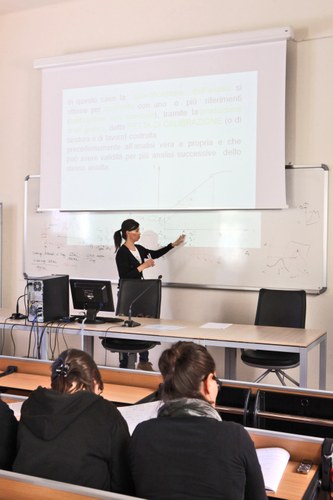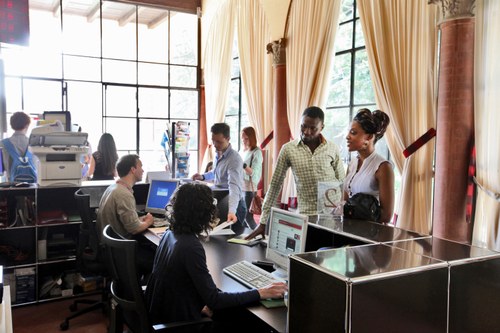For Lecturers and Offices
The Service sets out to foster the relationship between lecturers and/or professional staff and students with disabilities and SLD.
Teachers and Offices can contact the Service for support in planning teaching activities and services accessible to all.
The Service aims to build a collaborative network with the University's Facilities to promote their inclusiveness to the utmost.
The Service is happy to discuss with teachers the adoption of inclusive teaching methods and/or for the planning of methods and materials relating to lectures, exams and entrance exams meeting the needs of students with disabilities and SLD or other learning disorders.
The Service is also happy to discuss with the Administrative Offices measures aimed at obtaining increasingly greater accessibility to the organisation, to information and to university facilities.

Support services for teaching staff
The Service for Students with Disabilities and SLD is happy to discuss with teachers:
- possible ways of adapting teaching activities, taking into account the needs of students with special needs;
- the best relational/communication approach with students with disabilities;
- good practices in structuring teaching activities to ensure accessibility to all students with disabilities and SLD;
- exam adaptations to ensure learning assessments suited to the needs of students with special needs.
The Service for Students with Disabilities and SLD is also happy to:
- illustrate the services available and provide useful information with a view to adapting the study experience of students with disabilities and with SLD by participating, by invitation, in the meetings of the Department Boards or Study Programme Boards;
- define, together with the Study Programme Coordinator, or his or her delegate, specific adaptations to teaching activities, including experimental solutions, should this become necessary for students with special needs requiring the identification of ad hoc measures.
On July the 26th 2022 the Board of Governors approved the adaptations to entrance and progress exams and to attend classes for students with disabilities and SLD, which can be consulted on the University intranet.
Please consult the legislative framework for more in-depth information on the relevant national legislation.

Support Services for Offices
The Service for Students with Disabilities and SLD is happy to liaise and collaborate with all Offices to define shared policies, organisational methods and good practices ensuring the overall accessibility of the University’s educational opportunities, and to identify, together, solutions for managing the requests put forward by students with special needs.
The aim of this collaboration is to foster the development of an even more widespread culture of inclusiveness.
In the presence of such needs, the Offices may arrange a preliminary meeting with the Service to identify a shared course of action.
Currently, good practices and policies have been defined and consolidated in the following areas:
- Technical assessment of adaptation requests for participation in entrance exams, state exams for registration in professional registers, etc;
- Coordination with student administrative offices to define the contents of calls for applications for degree programmes and the relative forms, with regard to the part relating to adaptation requests from students with disabilities and SLD;
- Collaboration with Guidance and Job Placement Offices with regard to the needs of students with special needs;
- Collection and technical evaluation of adaptation requests for language proficiency tests administered by the University Language Centre, for placement tests for international exchanges, and for participation in the AlmaEnglish project;
- Collaboration with the University Language Centre to identify accessible ways of conducting language proficiency tests;
- Collaboration with the Offices of the International Relations Division for the technical evaluation of requests for additional Erasmus+ exchange grants for students with special needs;
- Collaboration with the Bologna Service Division to identify measures to ensure that spaces are increasingly accessible;
- Collaboration with the IT Services Division to share technical solutions, to develop applications for the management of certain services, and to implement infrastructures.